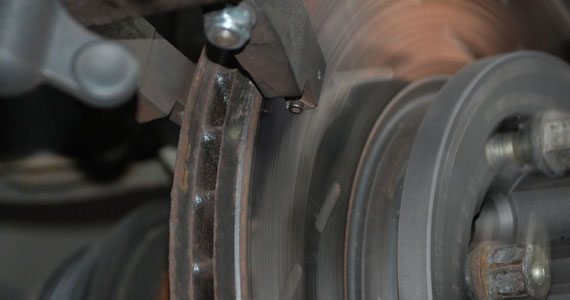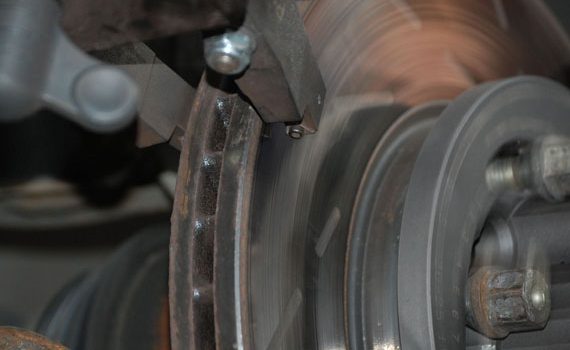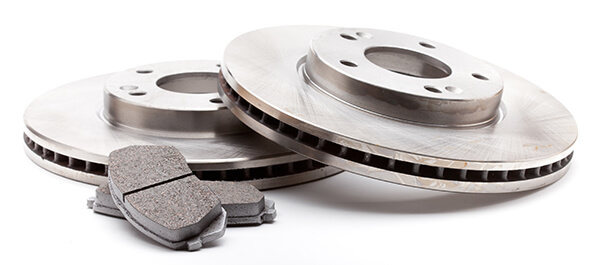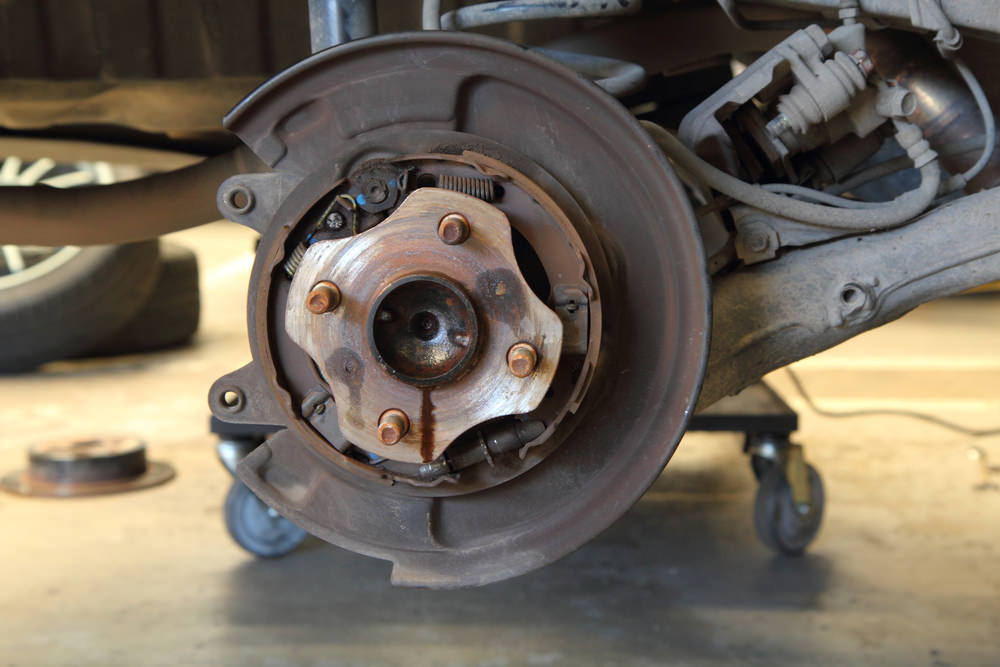

Brake Pads – 5 signs To Be Aware Of When It Comes To Your Brakes
Car RepairGeneral Info January 7, 2019 0
Brake pads aren’t the flashiest or most expensive car part you’ll ever buy, but they may just be the most important.
While it may be more exciting to buy a new set of alloy wheels, or fancy fender, the role brake pads play in driving should never be underestimated.
How do Brake Pads Work?
As far as modern vehicles are concerned, the braking apparatus comprises metallic discs behind each of the front two wheels. These discs are called rotors. Above them, you can find clamp-like devices, known as calipers.
While driving, as you press down on the brake pedal, the calipers gradually close on either side of the rotors. The resulting friction reduces the rotational motion of your wheels, until they stop completely.
Brake pads are a small, but integral part of this system. The brake pads are used by the calipers to pinch the rotors. However, due to wear and tear, these pads wear down and become less effective.
Unsurprisingly, brakes pads are one of the most commonly replaced parts of any vehicle. You should stay vigilant and look out for any issues with your brakes, as it’s important you always have the ability to stop your car as and when required.
Major Signs You Need to Replace Brake Pads
Major Signs You Need to Replace Brake Pads
Cars make all sorts of noises, from starting up, to putting it into gear, to braking, reversing or revving the engine. With experience, you’ll soon get a feel for your car, becoming comfortable with every little quirk so that you almost feel at one with it.
But however in love you are with your trusty four-wheeled friend, you should never take safety for granted. It’s up to you to make sure your vehicle is roadworthy.
That minor inconvenience you have been putting up with for a while may someday become a serious problem. When it comes to your brake pads, don’t take any chances.
Here are five signs to be aware of when it comes to your brakes.
1. There is a Squealing Noise
It might just be your petrified mother in the back seat, digging her fingernails into your leather headrest as you show her just what you can do since passing your driving test.
However, if you hear a squealing sound or scraping noise even when you’re alone in the car, then you can be sure there’s something more sinister going on. Hold off on calling the priest for an exorcism, and get a mechanic to have a look at the old girl (the car, not your mom).
He’ll likely confirm what you already know: there’s an issue with your brake pads. Newer brake pads are specially designed so that they can alert you to the fact that they are becoming worn down to dangerously low levels.
The wear indicators are a metal strip that causes that unsettling grating sound. If you ignore it long enough, the indicator and rotor start grinding on each other, delivering a haunting screech that will have old mom jumping out the window.
2. Clicking Noise
Some brake pads fit neatly into a holding device, while other vehicles keep the pads securely in place with pins or clips. In both cases, the idea is to stop the pads from moving around. However, like everything else, time can cause these devices to become loose. Once a vehicle has endured years of vibration from excessive driving, it might start to emit an unhealthy rattle. If you hear a clicking sound when you use your brakes, that’s what’s happening. Now you know.
3. Car is Slow to Stop
This is a common issue, sometimes called ‘brake fade’. It’s usually the result of excessive use of the brakes without actually stopping the car.
Many inexperienced drivers will constantly have their foot resting on the brake, squeezing it in a little every so often, stopping them from every really driving freely, but not actually bringing the car to a standstill each time. Others can use the same method of driving when they’re regularly on hills.
Whatever the reason, the result is the rotors and brake pads remaining in contact for long periods, which makes the components heat up. Over time, the friction won’t be as good as it was, which makes the car slower to stop.
4. Car Pulls to One Side When Braking
You might have two fresh brake pads on when you get the car, but there’s no guarantee they’re going to work as hard as each other. One might fade quicker than the other. When this happens, you’ll start to notice the car pulls to one side when you apply the brakes.
You have two choices here. The first option is to pay no attention to it and simply adapt how you drive by steering slightly in the opposite direction to the pull every single time you brake.
This will stress out the steering rack, and eventually cause damage to the ball joints, bearing, bushings and steering knuckles. It will cost you a small fortune down the line, and you’d be a fool to do this longer than it takes to get to where you’re going in that moment.
The second choice is to get new brake pads. While you’re at it, get the pros to check your tire pressure, wheel bearing and brake calipers too, just to be sure there’s nothing else to blame.
5. Vibrating Brake Pedal
The brake pedal vibrates when pressed.
Some things are made to vibrate. A dual-shock controller on the PlayStation is one such example that delivers excitement anytime it buzzes.
A brake pedal that violently shakes when you touch doesn’t have the same effect, and it’s preferable your brake pedals don’t do that, especially if you’re driving on a busy road.
Brake pads include a binding resin, which can heat up and ooze around the rotor as the pad wears down. In some cases, this resin isn’t distributed evenly over the brake disc, causing a glazing issue that makes the brake pedal vibrate.
It can be a heart-stopping issue if your pedal starts to do this on a highway or chaotic city road. Even the most carefree drivers can’t possibly ignore this issue for long.
Problems Beyond the Brake Pads
The concept of an anti-lock braking system, commonly known as the ABS control module, is to stop the wheels of a vehicle from locking up during driving. This is most useful during an emergency brake, as you don’t want your wheels losing traction after putting the brakes on.
Another key use of ABS is in rough terrain or bad weather. The system may well be what keeps you alive on icy roads.
For that reason alone, any problems with your ABS system should be considered a critical issue, which you should deal with immediately.
Here are some of the signs to look out for when your ABS control module starts to fail:
Wheels are Locking
As you now know, the main purpose of ABS is to prevent the wheels from locking. If this happens, you know there’s a problem. This will get worse over time, so ignoring it is not an option.7.
ABS Light is On
Newer vehicles have an ABS light and symbol on the dashboard. Hopefully, you won’t see it light up much, if at all. If it does glow amber, you can’t miss it. Ignore the pretty ambiance and drive to your nearest mechanic to see what’s going on.
Brake Pedal isn’t Responding
Imagine rolling downhill at speed, with several busy lanes of traffic intersecting the road ahead. You tap on the brakes….nothing. Then you stamp hard….nothing. What a nightmare. If you can pull that terrified look off your mug for a few seconds, you might be able to do a James Bond-esque roll out of the car in time. Just don’t forget to grab the kids and shopping before you do.
This problem usually starts slow, then gets worse over time, to the point you have to press down hard several times for the simplest of stops. Don’t be silly enough to wait for the nightmare scenario. Get it fixed sooner rather than later.
Speedometer Fails
This isn’t a common symptom, but it’s one worth knowing, just in case you happen to be the unlucky soul who winds up in such a pickle. In some very rare scenarios, a faulty ABS control module can cause your speedometer to crash.
This may give you the illusion that you are going slower than you actually are. It may even tell you that you are going at 0 mph, even when you’re clearly buzzing along the highway.
This is a problem that you’ll want to address sooner rather than later, otherwise, you could find yourself unwittingly racking up some speeding fines.
Bad Brake Pads are a Disaster Waiting to Happen
Don’t procrastinate on issues like these. Even if it seems like a minor flaw or mild inconvenience to drive with a pull to the left, or an extra hard push to stop on a hill, it’s not worth risking for long.
The problem will get worse over time. If someone else borrows your vehicle and isn’t aware or as comfortable as you in using the faulty brakes, it could end in tragedy.
When it comes to ABS, you shouldn’t ignore any issues, as the computer system is integral to the proper performance of the vehicle.
Don’t take chances with your brakes. If they stop working right, get it fixed immediately.



No comments so far.
Be first to leave comment below.